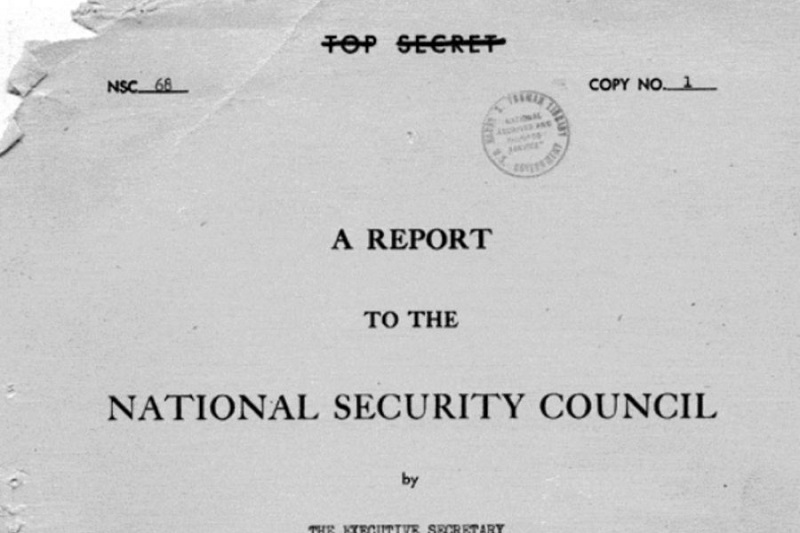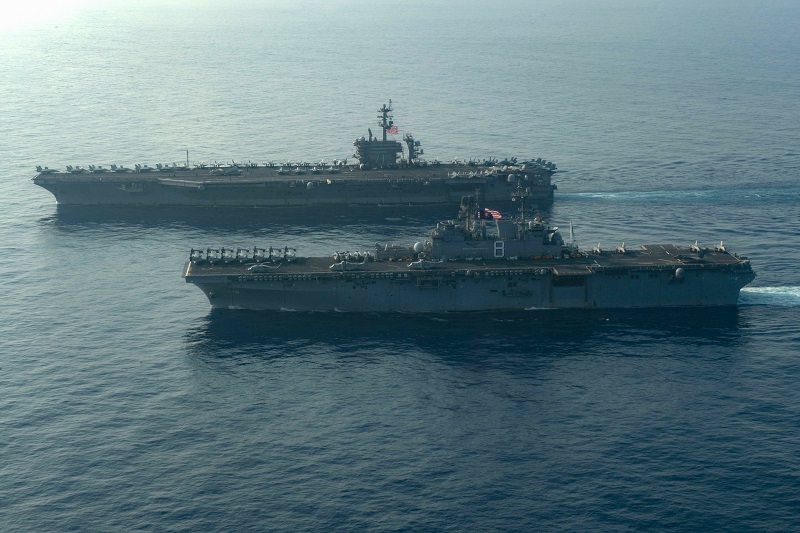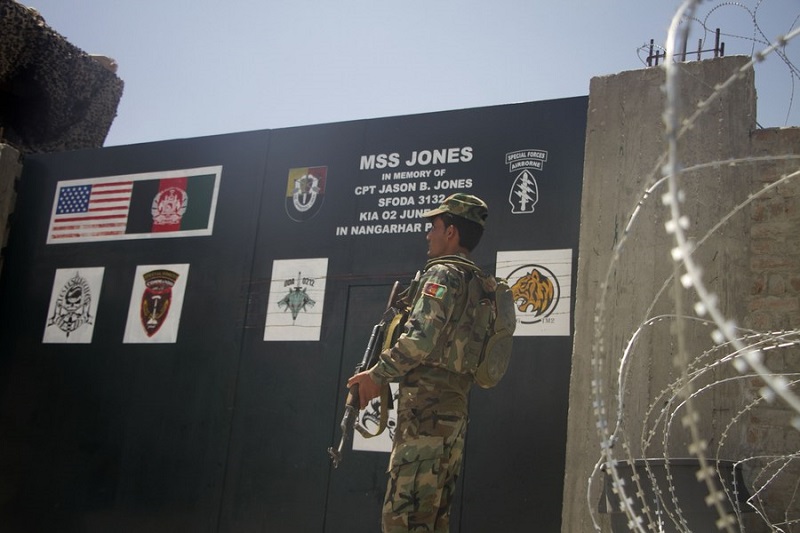Washington’s Cold War mindset and obsession with Militarism are leading to a dead end. The international situation is changing and a new constellation of forces is emerging but the United States clings to obsolete geopolitical theories and strategies.
Clinging to past strategies and obsolete alliances limits Washington’s flexibility and options amidst historic global change. Can the United States have a sustainable future with prosperity if it does not adjust correctly in an international system in transition to multipolarity, polycentrism, and pluralism?
Cold War militarization of US foreign policy
The militarization of post-World War II US foreign policy began in 1950 with a top-secret study by the National Security called “United States Objectives and Programs for National Security.” Known as NSC-68 the study was controversial at the time for its obsessive focus on military power.
In early 1950, President Harry Truman directed the State Department and the Department of Defense to undertake the study. A Wall Street financier, Paul Nitze, was put in charge of the project. He had served in various economic capacities in the federal government during the war but somehow, he reinvented himself as a foreign policy and strategy expert.
Nitze, the Wall Street banker, was a hardline anti-communist who advocated the global “Rollback” of communism primarily by military means. Rollback meant confrontation and pushing the Soviet Union out of territories it came to control at the end of World War II.
Opponents of the Rollback doctrine who were experienced professional American diplomats advocated a different policy. That policy, called “Containment”, emphasized diplomacy, economics, and various other policy instruments including a measured military posture. These career diplomats, ambassadors George Kennan, Llewellyn Thompson, and Charles Bohlen, were Soviet experts and not surprisingly they objected to the unnecessary militarization of foreign policy and Nitze’s aggressive Rollback doctrine.

The cover of NSC-68 (Photo/Harry S. Truman Library and Museum)
The Nitze plan called for massive military spending and military buildup. Nitze’s basic premise was that the Soviet Union sought to conquer Europe, Africa, and Asia if not the world itself. Nitze was joined by Secretary of State Dean Acheson, another fervent hawk, and they persuaded Truman to accept the recommendations of NSC-68 and thereby launch the Cold War from the US side. The Korean War was exploited by Nitze and Acheson by alleging that it was the first step in Soviet leader Joseph Stalin’s plan to conquer the world.
Such massive military spending was welcomed by Nitze’s Wall Street friends and the sector that President Dwight Eisenhower later called the “military-industrial complex”. Eisenhower, as Supreme Allied Commander in Europe, defeated the German military-industrial complex and well knew about what he was talking about.
Critics of the domestic economic consequences of Washington’s NSC-68 policy often refer to it as “military Keynesianism”. Proponents had argued that huge Cold War military expenditures were good for the US economy. Because they were good for the US economy, proponents said that the resulting budget deficits were not a bad thing because such deficits stimulated the economy.
Does This Cold War Mindset Sound Familiar?
Of course, it does. Look at the massive new US defense budget.
Congress and the DC Swamp are gripped in fear of the China dragon and the Russian bear appearing on the world stage these days. Little monsters like Iran also disturb American politicians. There appears to be mounting hysteria about an imagined world in which China and Russia might dominate Europe, Africa, and Asia thereby ending US global hegemony.

USS Makin Island (LHD-8) and the aircraft carrier USS Theodore Roosevelt (CVN-71) transit the South China Sea on Apr. 9, 2021. (Photo/US Navy)
Breathless politicians, media pundits, assorted military, and the usual think tanks hyperventilate and expatiate about these “emerging threats”. Geopolitical theories from the 19th and early 20th centuries are resurrected and bandied about. A favorite current theory calls for a “strategy of denial” to contain China and block its access to the Pacific as well as to block it from China’s own island of Taiwan.
To be fair, there are a few voices in opposition to such delusional thinking. Some academics, former government officials, and retired diplomats and military do speak out but are marginalized voices in the wilderness. They call for restraint and prudent foreign policy and propose various realistic options but the White House and Congress are obliviously neglecting that call as the Cold War mindset runs very deep in Washington. And it pays well.
Hysteria in Washington over China and Russia, duly exploited by an army of lobbyists, explains the recent vote in Congress to authorize $770 billion for defense spending. This unnecessary and obscenely bloated defense spending is not so different from Truman’s massive defense spending increase in an atmosphere of fear and hysteria.
Is there a behavior pattern here? Seems so. Truman dragged Americans into the Korean War and had to go around Congress to do it because Congress would have rejected a formal declaration of war. So, Truman called it a “police action” not requiring Congressional consent. The Vietnam War was also an undeclared war also called a “police action.” Will Biden drag Americans into yet another undeclared war called a “police action” over Ukraine or Taiwan? Or both?

An Afghan border forces soldier stands guard at a U.S. forces base which has been handed over to Afghan border forces in Dih Bala district of Nangarhar province, eastern Afghanistan, Jul. 20, 2020. (Photo/Xinhua)
Militarism influences Washington’s Cold War mindset
During the 19th century in Europe, two opposed trends in thought about the international system arose. On the one hand, “Internationalism” was advanced by proponents of international peace and understanding. Internationalists called for a sense of human solidarity and called for the use of diplomacy to reduce tensions and resolve issues. Invoking international law, these proponents of peace called for arbitration and diplomatic mediation of disputes rather than the resort to force, coercion, and war.
The second trend, however, the trend of “Militarism” became pronounced during the latter 19th century as the competition between various European empires sharpened. This, in turn, no doubt also influenced Japan toward imperial aggression and expansion.
In Europe, the violent and amoral philosophy of Friedrich Nietzsche gained a following as did the similar thought of Darwin and Spencer pointing to the “survival of the fittest” in nature. Such thinking entered into strategic doctrines, reinforced the growing European militarism, and sharpened the clash between the imperial powers. World War I resulted and World War II followed.
In the US, the militarization of foreign policy never really stopped since 1950. The perverse legacy of NSC-68 continues today in the White House, in Congress, and in the military-industrial complex. Various quagmires entangled the US in foreign adventures from Vietnam to Iraq and Afghanistan. But, looking at the record of failed US policy decade after decade, an observer can conclude that Washington learns nothing from sequential folly and failure.
This is a disturbing thought to be sure but Washington’s bloated $770 billion defense spending bill makes clear the American Cold War mindset remains active and drenched in Militarism.
Washington must change its ways and drop the Cold War mindset if Americans are to have a future worth looking forward to. Remaining on its present path of hegemony and confrontation will inevitably lead to a bleak future as the trajectories of past empires have shown.
The article reflects the views of the author and not necessarily those of China Focus.